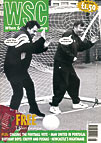 How one moment changed an entire season for Burnley, as told by Simon Evans
How one moment changed an entire season for Burnley, as told by Simon Evans
A group of us had vowed we would never set foot inside Wembley Stadium until Burnley played there. The oath had caused much ridicule but on 12th March 1983, we had the twin towers in our sights. Turf Moor was packed for the FA Cup Quarter-Final with Sheffield Wednesday. The kick-off was delayed as the organizers struggled to segregate the supporters. After going a goal behind, we had fought back with tubby Northern Ireland international midfielder Tommy Cassidy equalizing. With barely seconds remaining we were awarded a penalty. All striker Steve Taylor had to do was put it away and Burnley, battling at the wrong end of the old Division Two, would be in the last four of the FA Cup with Brighton to come in the Semis.
Taylor’s penalty kick ended up in row ten of the Cricket Field stand. In the replay we were hammered 5-0 at Hillsborough. The dream was over and the nightmare was just about to begin.
For a side made up of talented youngsters and veterans such as Cassidy and Martin Dobson who knew they would never get another chance to play at Wembley, the defeat was too hard to stomach – they simply couldn’t concentrate on the League. Following the Cup defeat, the Clarets then lost the next five games and were relegated to Division Three. Instead of the Charity Shield, the next season began with an away trip to Hull City.
Manager Frank Casper, who had been denied the resources to save us from relegation, found himself briskly and unjustly thrown out of a job. In his place came John Bond. Bond was everything Burnley wasn’t. He was a sharp-talking, sharp dressing, big-spending “character”. For all intents and purposes he was a Southerner, and worse still Elton Welsby loved him. Someone like that has to tread very carefully in a place where for decades coaches and managers had been appointed from within.
Bond’s first decision was a sign of things to come. He signed Tommy Hutchison, who with his old-fashioned wing play had the potential to be a terrace hero. But Bond chose to make his new signing captain, in place of Martin Dobson. Dobson, like Hutchison, was nearing the end of his career. But unlike Hutchison, he was a Claret. He had captained us to promotion in 1982 and, in time, the immensely popular and intelligent former England international was expected to move into coaching. Worse still Bond dropped Dobson from the side all together.
Bond had broken the most sacred of rules at Turf Moor, he had mistreated a Claret. Bond also decided that popular young full backs Brian Laws and Lee Dixon weren’t good enough for Division Three and sold them for peanuts to Huddersfield and Bury. Laws went on to enjoy a distinguished career with Nottingham Forest and Dixon became an England international.
In place of the homegrown youngsters Bond brought in a series of ageing players from his previous clubs on generous contracts. By the end of the season, Bond had left, leaving behind a huge overdraft, a reserve team full of has-beens, and a famous youth system destroyed. Three years later bankrupt Burnley had to defeat Orient on the last game of the season to avoid relegation to the Vauxhall Conference. Thanks largely to Bond’s spending, the banks had made it clear that relegation would mean the winding-up of the club. Burnley survived, and a year later, we finally made it to Wembley. It was a wonderful day – almost 80,000 turned out for the final of the Sherpa Van Trophy against Wolves. The competition had been ridiculed, but the final became an emotional celebration of the survival of two great old clubs who were emerging from years of life-threatening mismanagement. In the Burnley side that day was a man whose battling qualities and commitment to the Clarets had earned him a second-spell at the club – a journeyman striker by the name of Steve Taylor.
From WSC 123 May 1997. What was happening this month